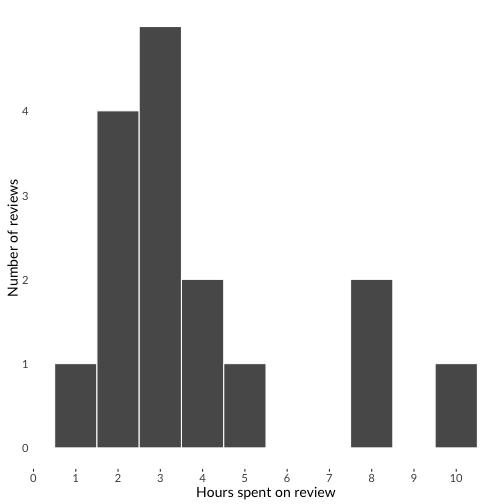
Code review, in which peers manually inspect the source code of softwarewritten by others, is widely recognized as one of the best tools for findingbugs in software. Code review is relatively uncommon in scientific softwaredevelopment, though.

Code review, in which peers manually inspect the source code of softwarewritten by others, is widely recognized as one of the best tools for findingbugs in software. Code review is relatively uncommon in scientific softwaredevelopment, though.

Geospatial data input/output, manipulation, and vizualization are tasks that are common to many disciplines. Thus, we’re keenly interested in making great tools in this space. We have an increasing set of spatial tools, each of which we’ll cover sparingly. See the cran and github badges for more information.
The rOpenSci team is growing, thanks in part to our recent funding. We recently welcomed Jeroen Ooms on the software development side and today we’re thrilled to announce a position for community manager. Our mission is to expand access to scientific data and promote a culture of reproducible research and sustainable research software.
The rOpenSci Unconference is coming to Australia and we are excited!! The event will take place in sunny Brisbane, on April 21-22 2016 hosted at the Microsoft Innovation Centre.
Scientific articles are typically locked away in PDF format, a format designed primarily for printing but not so great for searching or indexing. The new pdftools package allows for extracting text and metadata from pdf files in R. From the extracted plain-text one could find articles discussing a particular drug or species name, without having to rely on publishers providing metadata, or pay-walled search engines.
We’ve got a big year ahead of us as we work towards expanding our team and organizing various events and activities. We remain committed to supporting and expanding the landscape of open source tools that are available to researchers. While much of our focus has been around making it easier to access various data repositories, we are keen on improving other parts of the research pipeline, including data munging, documentation and sharing.
rOpenSci, whose mission is to develop and maintain sustainable softwaretools that allow researchers to access, visualize, document, and publishopen data on the Web, is pleased to announce that it has been awarded agrant of nearly $2.9 million over three years from The Leona M. andHarry B. Helmsley Charitable Trust.
A new version of rentrez, our package for the NCBI’s EUtils API, is makingit’s way around the CRAN mirrors. This release represents a substantialimprovement to rentrez, including a new vignettethat documents the whole package.
We’re happy to announce the launch of a CRAN-style repository for rOpenSci at http://packages.ropensci.org This repository contains the latest nightly builds from the master branch of all rOpenSci packages currently on GitHub.
Despite the hype around “big data”, a more immediate problem facing many scientific analyses is that large-scale databases must be assembled from a collection of small independent and heterogeneous fragments – the outputs of many and isolated scientific studies conducted around the globe. Collecting and compiling these fragments is challenging at both political and technical levels.